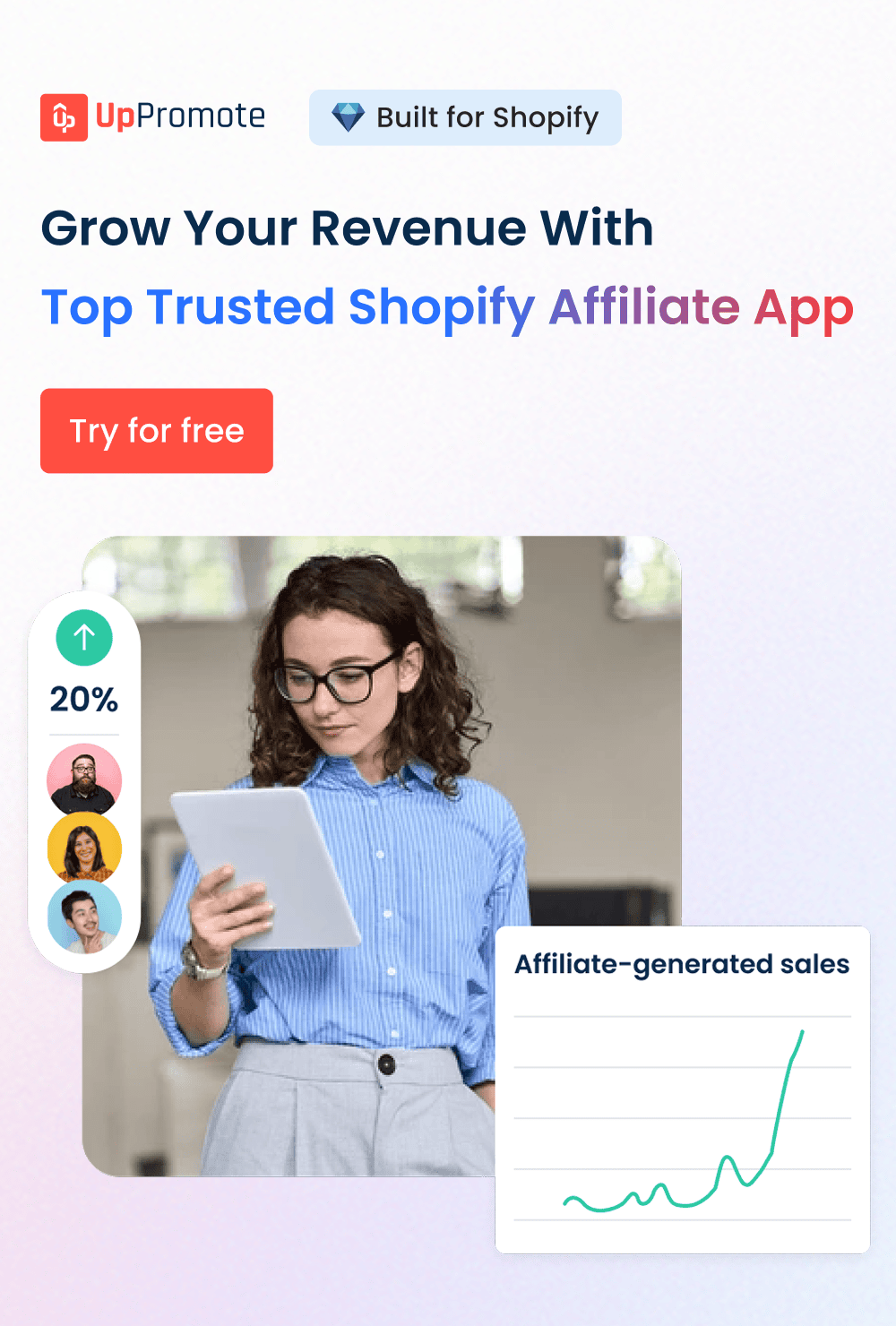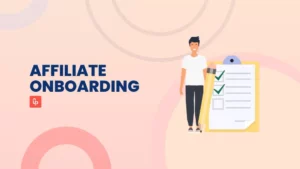You’ve probably seen it everywhere: influencers sharing affiliate links in Instagram stories, YouTubers adding discount codes in video descriptions, and bloggers linking to their favorite brands with “shop now” buttons.
This type of promotion is no longer just a trend; it has become a staple in modern marketing. Affiliate marketing has evolved into a key growth strategy for brands across industries. In fact, over 80% of companies worldwide (Rakuten) now run their own affiliate programs to drive sales, expand reach, and build trust through partnerships.
So here’s the question: If everyone’s in, can you afford to sit this out?
Maybe you’ve been thinking about how to create an affiliate program for your business, but you’re not sure where to begin. What tools should you use? How do you set things up without a technical background or a full team behind you?
You’re not alone. Many merchants feel exactly the same way when starting out. The good news is, you don’t need to be an expert to get started. You just need a clear roadmap and the right software.
This guide walks you through 8 clear steps to create a successful affiliate program, from goal-setting and commission planning to tracking results and scaling fast.
Here’s what we’ll cover:
Step 1: Clarify your goals and choose the right products
Step 2: Decide on commission rates and payment methods
Step 3: Outline the rules and conditions for affiliates
Step 4: Choose an affiliate management app that suits your needs
Step 5: Equip affiliates with necessary materials
Step 6: Find and partner with ideal affiliates
Step 7: Manage and support affiliates
Step 8: Monitor and assess affiliate performance
Before going further, let’s get real for a moment.
It’s nearly impossible to grow with spreadsheets and manual tracking. Managing links and calculating commissions by hand is time-consuming, error-prone, and hard to scale.
That’s why using a tracking app isn’t optional. It’s essential from day one to stay organized and keep things running smoothly.
If you’re ready to dive in, we’ll also show you how to set up everything using UpPromote, the top trusted Shopify affiliate solution for growth, featuring a 4.9/5 rating and over 2,500 reviews.
And the best part? You don’t need any prior experience.
It takes less than 5 minutes to set up an affiliate program with UpPromote.
Affiliate Program Definition & How It Works
An affiliate program is a performance-based system that business owners create to encourage people (bloggers, content creators, influencers, etc.) to promote their products in exchange for a commission or other rewards for any actual sales generated.
A typical affiliate program works like this:
- You launch an affiliate program
- Affiliates (publishers, bloggers, influencers, or other businesses) sign up for your affiliate program
- Affiliates get unique tracking links or codes for the products/services they want to promote
- Affiliates promote your brand on their blogs, social channels, etc.
- Customers make purchases through the affiliate’s link/use the affiliate’s code
- The sales are tracked and credited to the right affiliate
- You pay the affiliate a commission
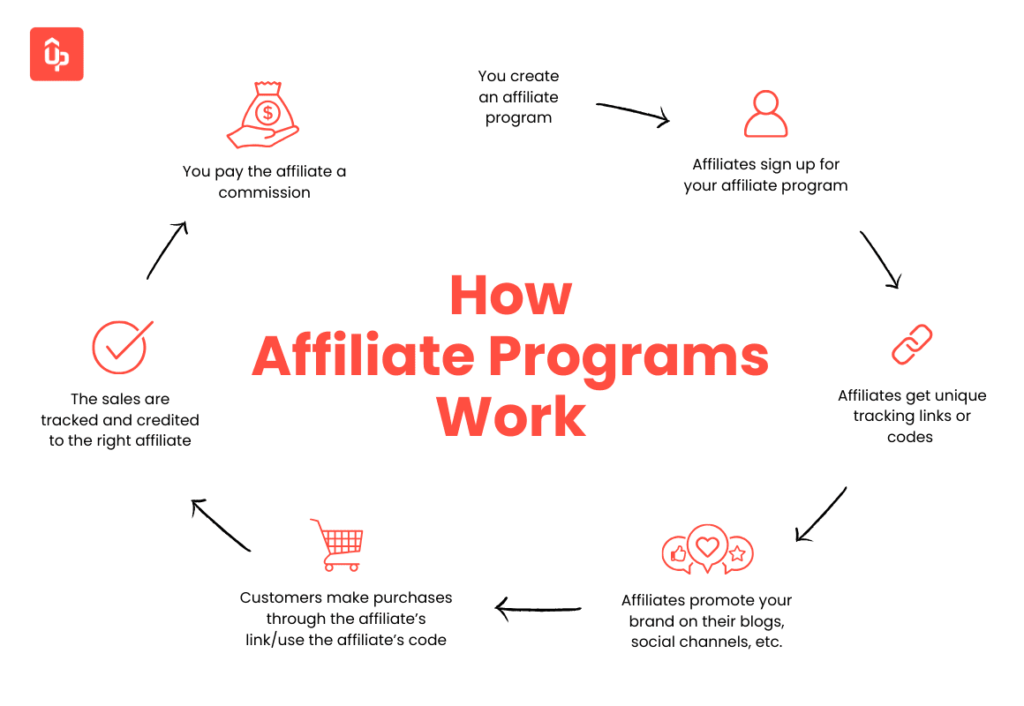
Why Should You Run an Affiliate Program for Your Business?
You might wonder: Why put time and effort into an affiliate program? Why do so many brands leverage affiliate marketing, whether they sell physical products, digital services, or run an online subscription business?
The answer lies in the benefits it brings to your online business, including:
- Cost-effective & low-risk: You only pay affiliates when they generate actual sales or leads, avoiding upfront costs and wasted spending on marketing channels that don’t perform well.
- High return on investment (ROI): Affiliate marketing provides $15 for every dollar spent (Impact), nearly doubling the return compared to paid ads, which typically yield $8 per dollar.
- Good flexibility: You can create multiple affiliate programs with various commission models and adjust them based on campaign results to fit your affiliate pricing and customer acquisition cost.
- Broader audience reach: Think of your affiliates as your brand’s biggest advocates. They introduce your products to their existing followers—people you might never have reached on your own.
- Increased traffic: Your partners use their blogs, social media, emails, and other channels to talk about your products and direct their audience to your store’s website.
- Enhanced brand credibility: When a trusted person recommends a product, you’re more likely to try it. Affiliates’ recommendations work the same way, making their fans more likely to buy your products.
8 Steps to Create a Successful Affiliate Marketing Program
Now that you understand the value of an affiliate marketing program, the next question is how to set one up for your business.
Creating an affiliate program involves identifying your goals, evaluating the products you intend to sell, and designing the program to meet both your business objectives and the needs of your affiliates.
Follow our detailed affiliate checklist to get your program up and running:
1. Set your goals and choose the right products
First, think about what you want from your campaign. Are you aiming to:
- Grow overall sales for your store?
- Boost sales of a certain product?
- Drive more traffic to your site?
After defining your overall goals, set specific targets for a certain period. For example:
- Achieve an X% growth in total sales next quarter by partnering with Y new affiliates.
- Increase Product A sales by X% next month using an exclusive discount code for influencers.
- Attract X new visitors in 3 months by teaming up with Y bloggers.
Next, choose the products for your campaign carefully. Focus on items that offer strong profits and are attractive for affiliates to promote.
Here are some types to consider:
- Best-sellers: High-demand products can be easy to share and push, boosting affiliates’ chances of earning commissions quickly.
- High-priced items: These can offer higher earnings, making them more appealing to affiliates. For example, 10% on a $80 product is better than on a $5 one.
- Trending products: Hot items that can help affiliates tap into current trends and attract customer attention easily. If you run a fashion store, featuring the latest season’s collection can be effective. You can see how PrettyLittleThing collabs with influencers to promote its fall and winter products:

With UpPromote, you can easily set a special commission rule for a specific product or collection.
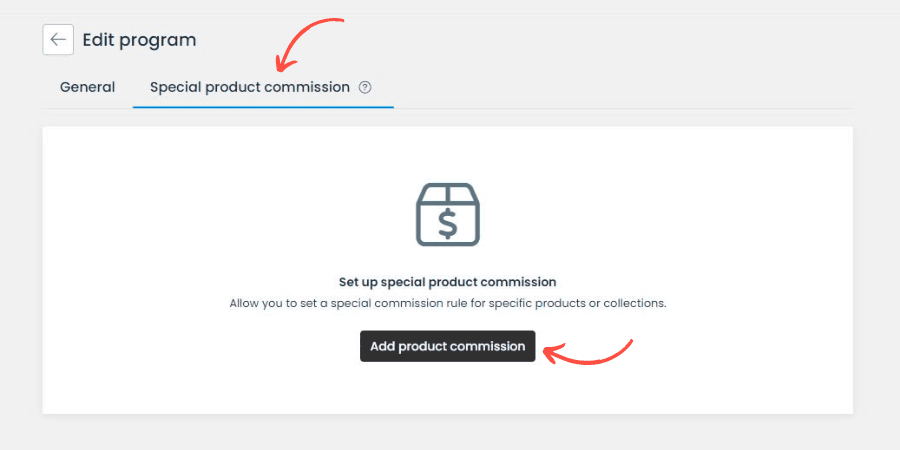
You can either add individual products or entire collections, then assign the preferred commission rate to complete the setup.
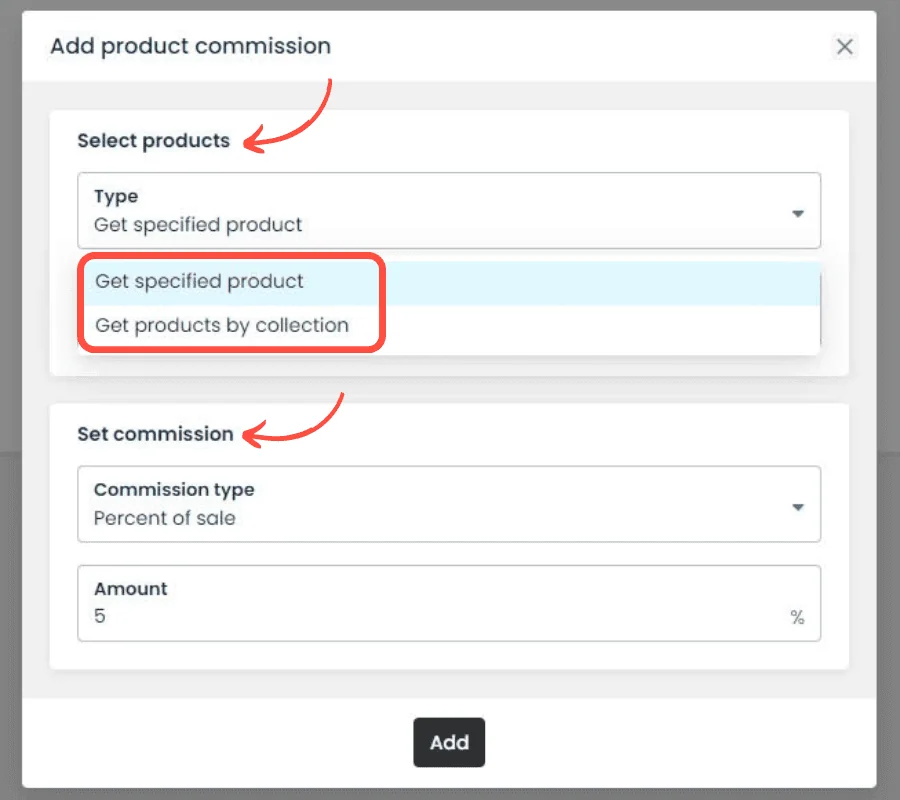
2. Determine commission rates and payout structures
The next crucial step is to decide how you will compensate partners for the results they generate. This will be the sweet spot of your program, motivating great affiliates to join.
Affiliate commissions come in a few flexible formats. The best part? You don’t have to pick just one. You can mix and match depending on your product and goals:
- Percent of sale: Affiliates earn a percentage of each order, like 10% of the total cart value.
- Flat rate per item: Pay a fixed amount per product sold, such as $10 per t-shirt.
- Flat rate per order: Offer a standard payout for each completed referral, such as $15 per order.
- Tiered commission: Reward high performers with increasing rates—10% for under $500 in sales, 15% for $500+, and so on.
Sounds good, right? But here’s the tricky part: how much should you actually offer? This is where many merchants hesitate. If your offer is:
- Too low → you won’t attract top affiliates.
- Too high → you’re eating into your profit.
So, how do you strike the right balance?
Let’s break it down with a simple example.
Imagine you’re selling a product for $100. It costs you $20 to produce it, and your overhead (like rent for an office, packaging, staff salaries, etc.) adds up to another $40. If you want to save and reinvest $20, that leaves you with $20 of “play” money per sale.
In this case, starting with a 10% commission ($10) is a solid benchmark. From there, you can use the remaining $10 as a bonus pool—maybe boost rates for top affiliates, or offer extra perks for seasonal pushes.
💡 Pro Tip: Don’t just guess—run the numbers
The best approach is to crunch your own numbers. How much room do you realistically have for affiliate payouts without hurting your business? Start there.
You can also look at what other brands in your niche are doing, especially by analyzing your competitors’ affiliate programs:
- Are they offering 5% or 20% commissions?
- Do they use flat rates or tiered rewards?
Affiliates compare programs, so you should too. This gives you a baseline idea of what’s competitive, while helping you stand out if you’re offering more.
And don’t forget to check your industry’s standard before finalizing your decision. We’ve done the research for you, so you don’t have to:
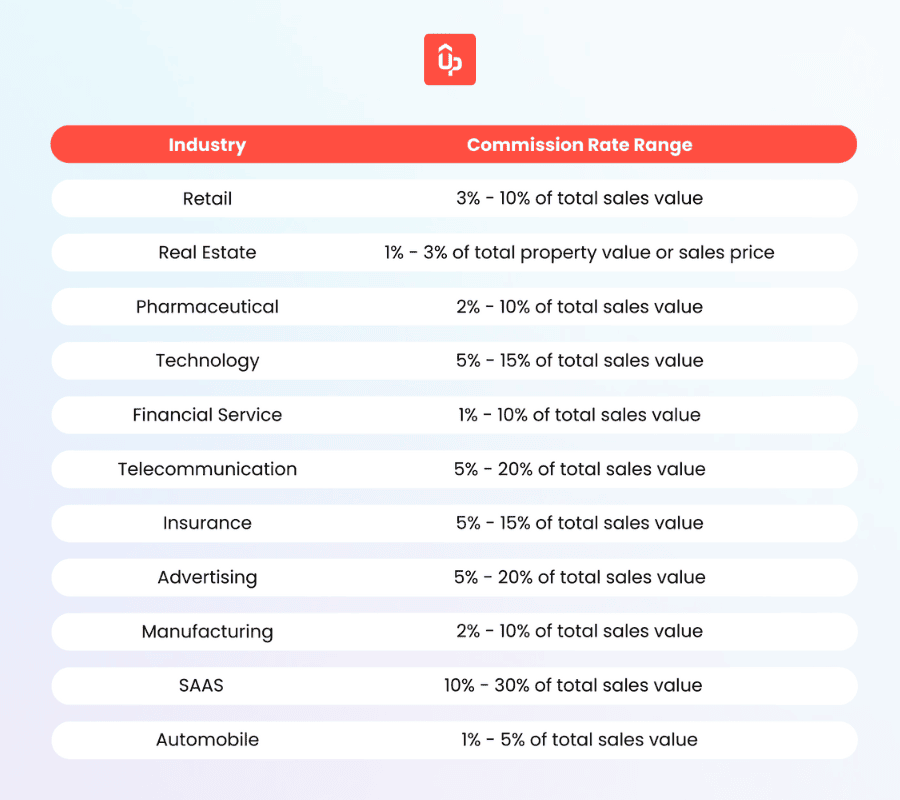
✅ Bonus tips: Get creative with your commission structure. Once you’ve nailed down a base commission, consider adding flexible rewards:
- Higher commission for top affiliates
- Extra bonus if they hit a monthly sales target
- Exclusive rates for promoting new products
This way, you motivate affiliates and stay in control of your margins.
Want proof that this strategy works? Take Kess Berlin, for example. They achieved something many brands aim for: Over 44,000 referrals were generated by just 44 active influencers.
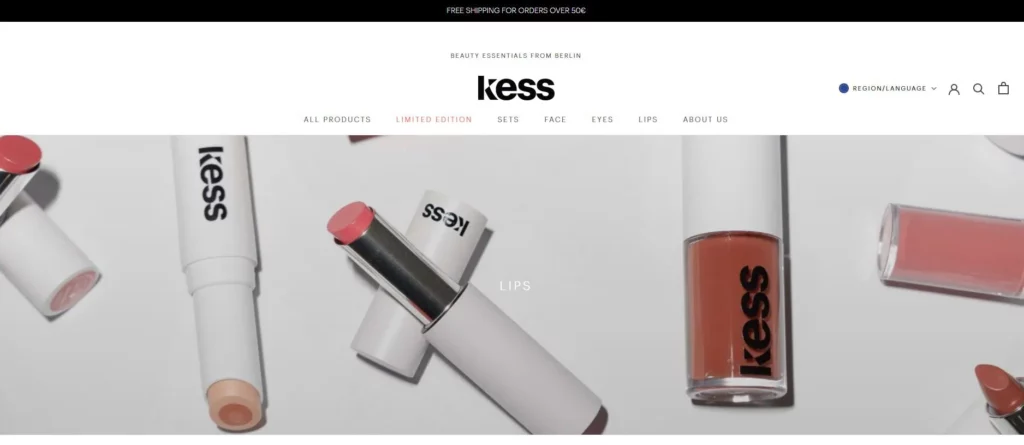
So, how did they make it happen?
Instead of relying on a single commission format, the brand built a flexible structure that rewards both reach and results.
- Every influencer earns a flat rate (up to €500) for each Instagram story or post they publish.
- On top of that, they also receive a 10% commission on every sale driven through their affiliate link.
This approach acknowledges the time and creativity behind content creation while still tying earnings to actual sales performance.
By combining content-based incentives with performance-based rewards, Kess Berlin created an affiliate program that not only attracts quality partners but keeps them actively promoting. Their thoughtful commission strategy played a big role in driving such impressive results.
Kess Berlin built this hybrid structure using UpPromote.
Would you like to try a creative commission model like this for your own brand?
With UpPromote, you can:
- Customize commissions by product, affiliate group, or campaign
- Combine rewards with sales-based payouts
- Automate tracking, tiering, and payouts—all in one place
Turn on UpPromote’s powerful settings to craft a lucrative commission structure that affiliates can’t resist!
Next, make sure your affiliates know how and when they’ll get paid. This helps them feel secure about their affiliate income and confident in working with you.
For affiliate payments, choose a method that works well for both you and your affiliates (bank transfers, checks, PayPal, etc.) to ensure timely payouts. Also, review the transaction fees to confirm they align with your financial plan.
3. Define your affiliate terms and conditions
Clear and detailed terms and conditions are key to a smooth, transparent affiliate program. They protect your business and set clear expectations for your affiliates, reducing misunderstandings or disputes.
When setting your affiliate terms, be sure to cover these key areas:
- Program rules: Requirements to join, enrollment process, and affiliate responsibilities.
- Marketing guidelines: How to represent your brand, what materials you provide, and what’s prohibited (e.g., spamming, misleading ads).
- Commission structure and payment methods.
- Referral tracking, including the use of affiliate cookies and your cookie policy.
- Legal aspects like confidentiality, proprietary rights, and termination.
For example, take a look at Leadpages, a popular website builder. They drafted transparent and detailed terms for their affiliate program to protect both themselves and their affiliate partners, avoiding confusion from the start.
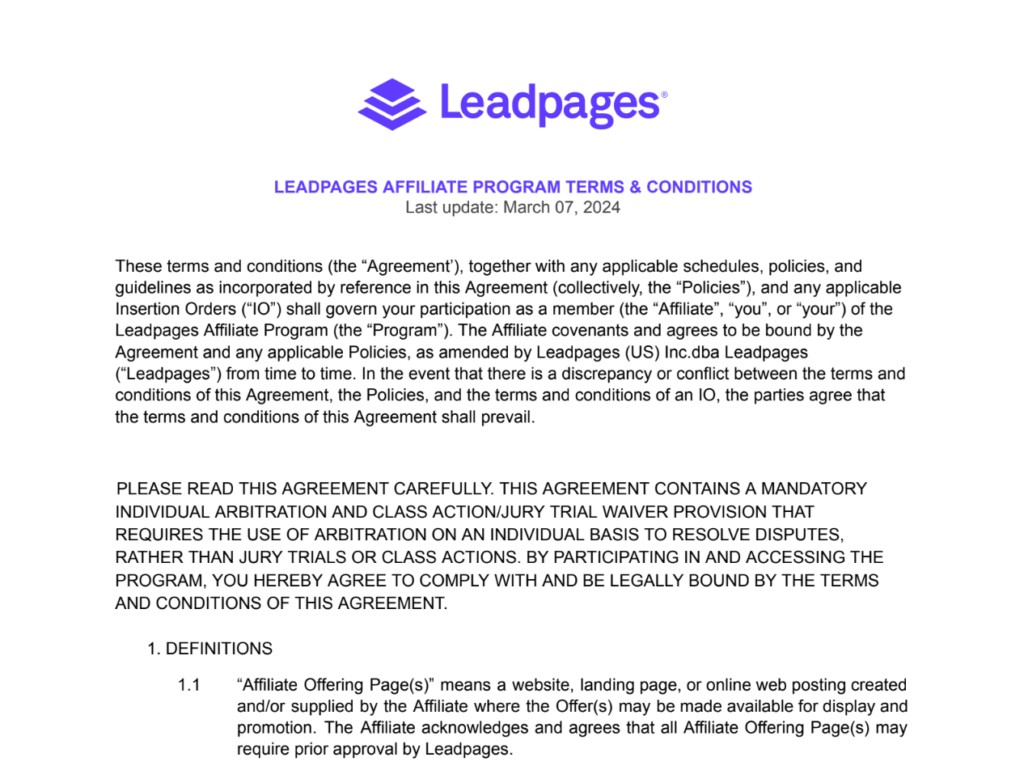
✅ Bonus tip: Consult with a legal expert to ensure your affiliate terms and conditions comply with all relevant legal requirements for your business when creating an affiliate program.
4. Choose the right affiliate marketing software
So you’ve done the math and decided on a commission structure that works for your business. The next challenge is how to bring that plan to life and actually run a working affiliate program.
You’ve probably seen it countless times—bloggers and influencers sharing affiliate links or discount codes from a brand to their followers.
It looks simple from the outside. But behind that post is a system that creates those links, tracks the results, and handles payouts properly.
That’s where a dedicated affiliate marketing software comes in.
Even with a solid commission plan, managing everything manually—creating unique links, tracking performance, setting commission rules, and calculating payouts—can get overwhelming fast.
And as your program grows, it becomes nearly impossible to scale without the right system in place.
A powerful affiliate app takes care of the heavy lifting and helps you:
- Generate unique affiliate links and coupon codes effortlessly
- Apply different commission rules based on products or campaigns
- Track performance in real time without spreadsheets
- Handle payouts on time with reliable automation
If you’re looking for a tool that does all that—and makes setup feel easy, even for non-tech users—meet UpPromote. UpPromote is the top-trusted affiliate marketing app on Shopify, with over 115,000 merchants using it to run their programs.
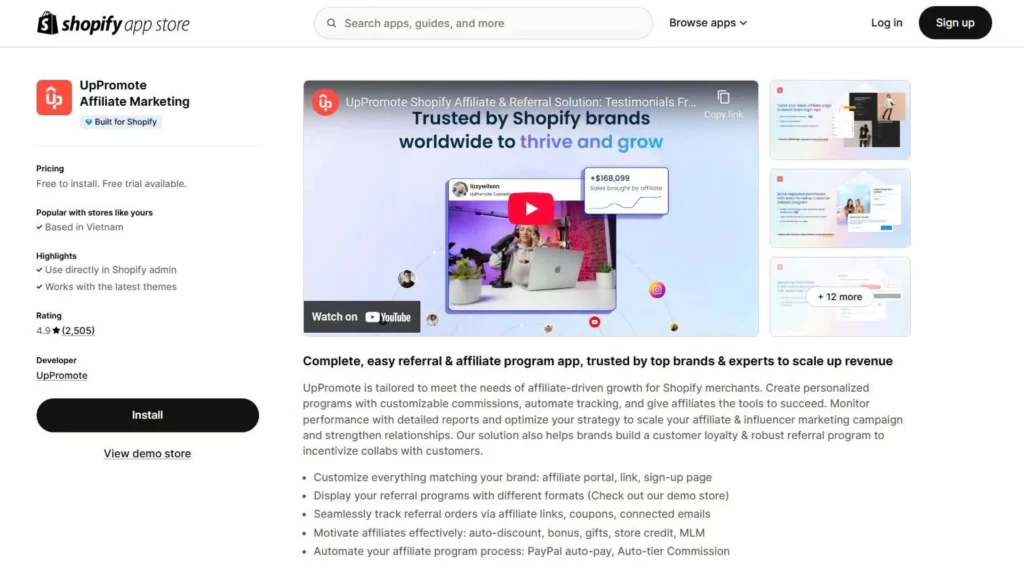 Here’s what you can expect with UpPromote:
Here’s what you can expect with UpPromote:
- Start for free and scale as your business grows
- Launch your program in minutes with a no-code setup and intuitive interface
- Automatically create and assign affiliate links and coupons—no manual work required
- Set up commission rules for specific products or affiliate groups in just a few clicks
- Monitor real-time data on clicks, conversions, and commissions with a built-in dashboard
- Automate commission calculations and schedule payouts via PayPal seamlessly
But it doesn’t stop there. If you need help along the way, you’re covered. UpPromote’s 24/7 support team is always ready to assist.
Bring your affiliate program to life—without the tech stress. UpPromote helps you track, reward, and scale your program effortlessly.
5. Provide ready-made affiliate marketing materials
Make sure everything is set so affiliates can start promoting your products as soon as they join your program. Give them access to high-quality marketing assets that are ready to use so they can focus on driving traffic and making sales instead of creating content from scratch.
Plus, using consistent, well-designed materials helps build trust and makes their marketing efforts more effective.
With UpPromote, you can easily provide your partners with a variety of marketing resources. Our affiliate platform allows you to upload different types of media (images, videos, documents, links) in just a few clicks.
From the affiliate dashboard, your partners can quickly view these assets and then copy or download their preferred ones to share with their followers.
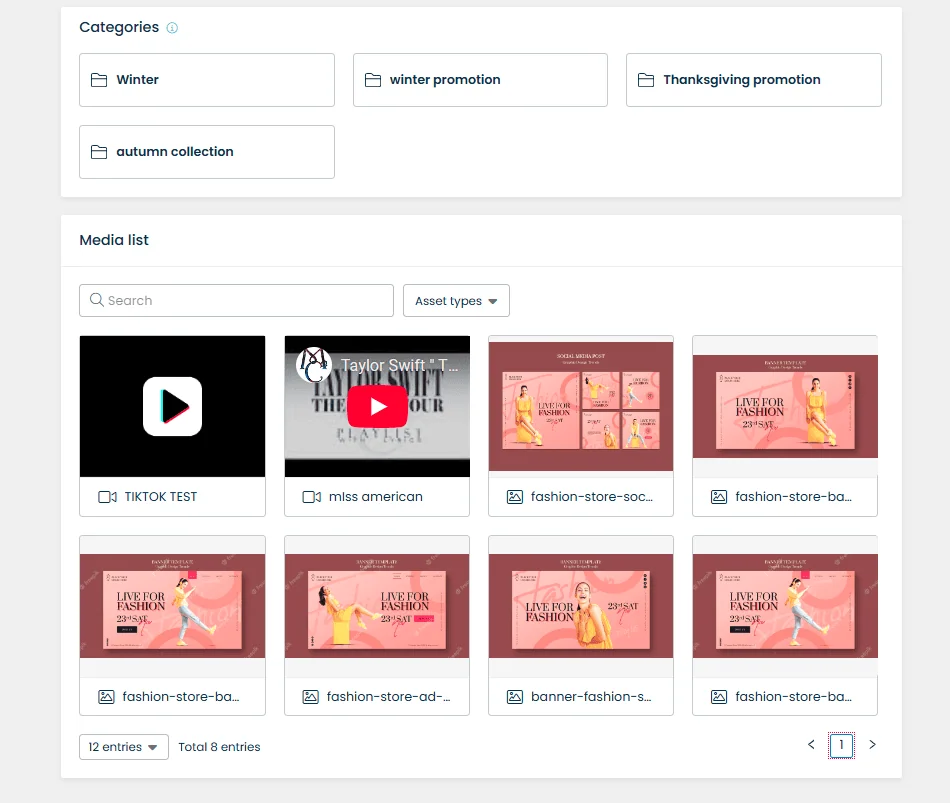
6. Find and recruit high-quality affiliates
Your affiliate program only becomes truly active when affiliates get on board. That’s why you need a plan to recruit affiliate marketers and invite them to join.
Let’s consider the following popular methods:
Take advantage of your own website
Promoting your affiliate program right on your site is a great way.
Create a clear, easy-to-find affiliate signup page. Optimize it for search engines or run ads to help potential partners discover your campaign.
HubSpot created a dedicated landing page to introduce its affiliate program. The brand displays it in the website’s footer, making it easy for people to find and navigate.
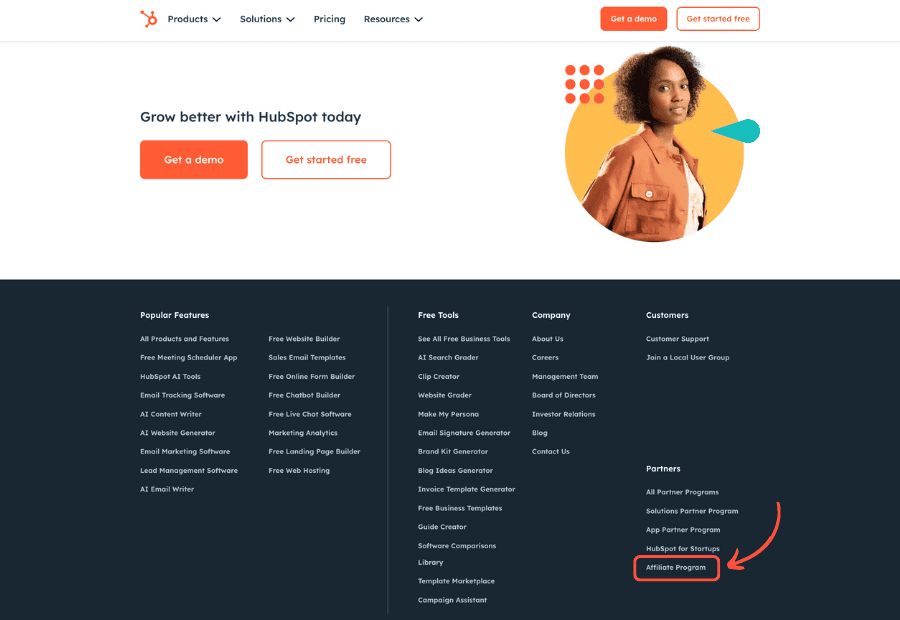
Leverage extensive affiliate networks
Affiliate marketing platforms like ShareASale, Impact, Rakuten, and UpPromote’s Marketplace already have thousands of active affiliates browsing for new programs to join. By listing your offer on these platforms, you can tap into an existing pool of motivated partners, saving time and effort compared to cold outreach.
If you’re using UpPromote, the built-in Marketplace makes this even easier. You can:
- Set criteria for ideal affiliates—like age, gender, location, and preferred promotion channels
- Add key program details such as commission rates, payment methods, and product descriptions
- Showcase your brand with your store URL, promotional banners, hashtags, and more
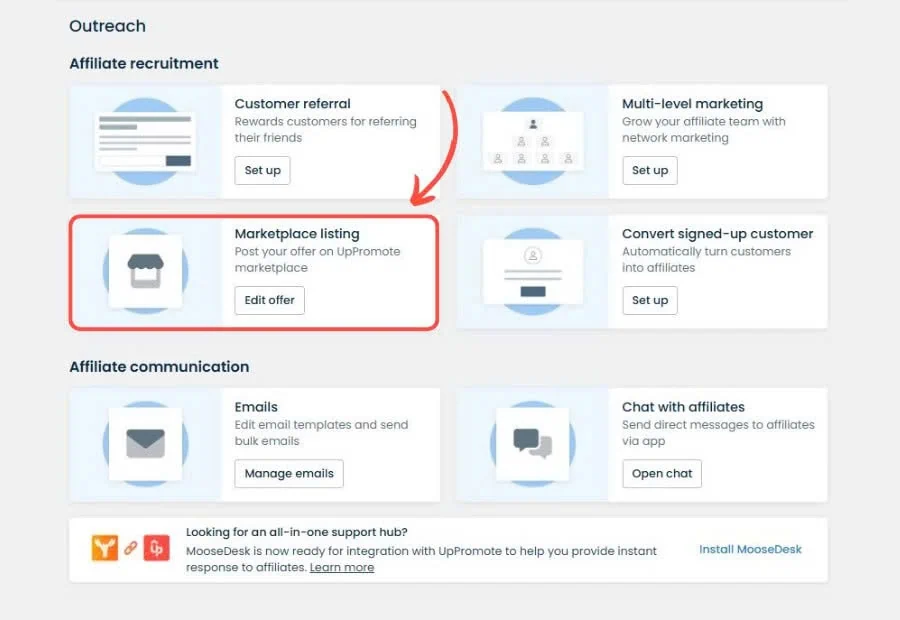
With over 20,000 affiliates actively exploring the UpPromote Marketplace, your program has a high chance of getting discovered by the right partners.
🌟List your program on UpPromote Marketplace today and start attracting affiliates who are already looking for what you offer.
Utilize social media
Another strategy for grabbing the attention of potential affiliates is to announce your affiliate program on your social channels, such as Instagram, Facebook, or LinkedIn.

You can also use keywords or hashtags related to your niche to find bloggers, content creators, and influencers who can promote your brand.
Use email marketing
If you have an email list, utilize it to attract affiliates. Inform your subscribers of your program and invite them to join.

You can use personalized emails to make your recruitment plan more effective, especially when reaching specific affiliates.
Attend affiliate groups or forums
Participate in discussions or browse through threads to gather information on various publishers, including competitors’ affiliates, to find the right fit for your brand.
If you own a makeup store, you can browse Quora discussions to see which affiliates other brands collaborate with to promote their products. From there, you can evaluate their content and engagement rates to find potential partners

After having a list of potential partners, take the time to review them carefully so you can find the right affiliates to team up with.
Before making an outreach, you should:
- Check their blogs and social media accounts to see whether their audience is a good match for yours.
- Review and make sure they create high-quality content that aligns with your brand’s values and personality.
- Ensure they have a strong and active online presence, with a large social media following and good engagement rates.
For example, Fashion Nova, a well-known fast fashion brand, seeks out models and lifestyle influencers for collaborations. These ambassadors typically have over 100,000 followers on Instagram and receive an average of 5,000 likes and around 300-500 comments per post.

7. Manage your affiliates
Once you have your team in place, you need to focus on affiliate management. This is a crucial part of running a successful affiliate program.
It’s not just about monitoring their performance; it’s also about keeping them engaged, motivated, and supported to achieve better results.
Provide ongoing support and training to affiliates
Effective management starts with properly training affiliates during the onboarding process. Ensure your partners have the right knowledge and tools to promote your business:
- Clearly explain your campaign goals and expectations.
- Make sure they understand your program’s rules, products, and brand values.
- Provide them with curated online marketing materials like logos, product images, videos, and pre-written content to stay on-brand
But it doesn’t stop there.
Make yourself available to answer questions and provide dedicated support whenever your affiliates need it. Here are some things you can do:
- Share updates on your program, new products, or promotions.
- Host webinars, make tutorials, or send emails with best practices and trends.
- Check-in if they’re less active and offer assistance.
With UpPromote, you can easily provide affiliates with a detailed guide from day one. You can update a walkthrough video, important notes, program highlights, or special announcements for affiliates. Your partners can see this in the Guide tab of the affiliate dashboard after they log in.
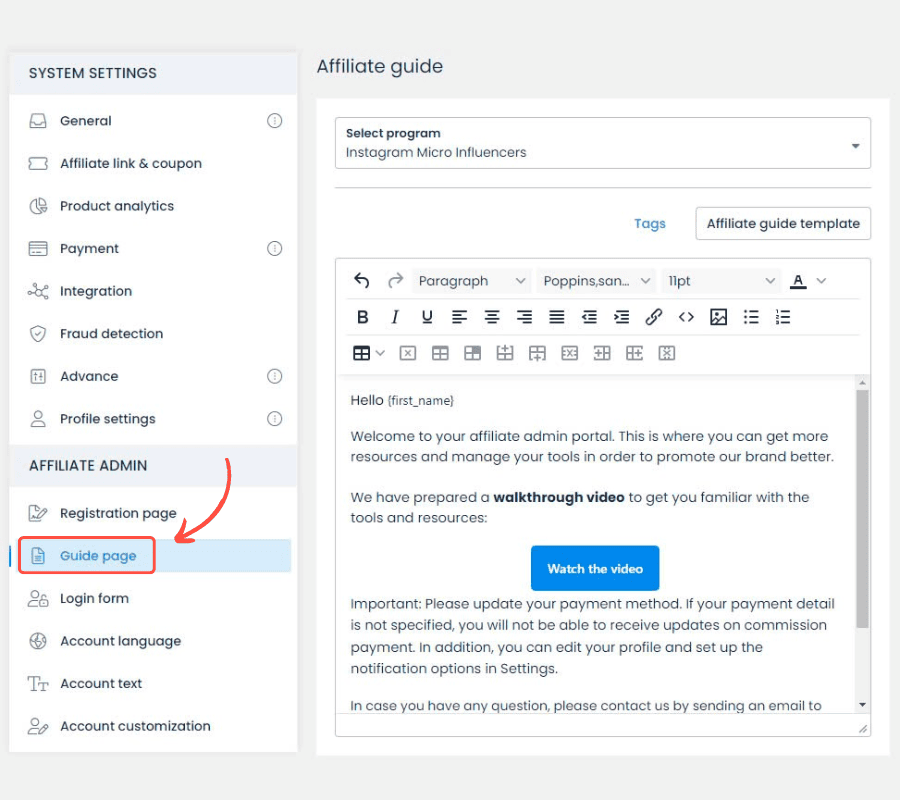
Besides that, you can connect with affiliates quickly through email or in-app chat with our system. There are 2 options available for you.
- Email: You can customize email templates to keep affiliates updated about new product launches, promotions, or program changes. You can even send bulk emails to reach all your partners quickly.
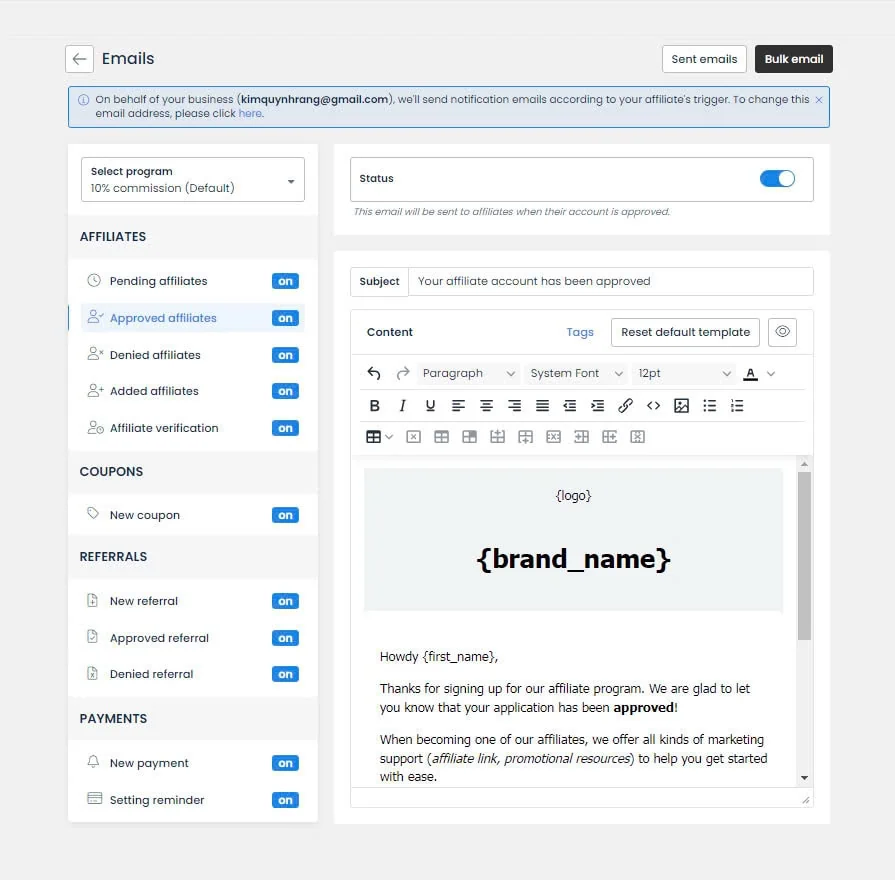
- In-app chat: You can chat and send private messages to affiliates within the app if you prefer more personalized communication.
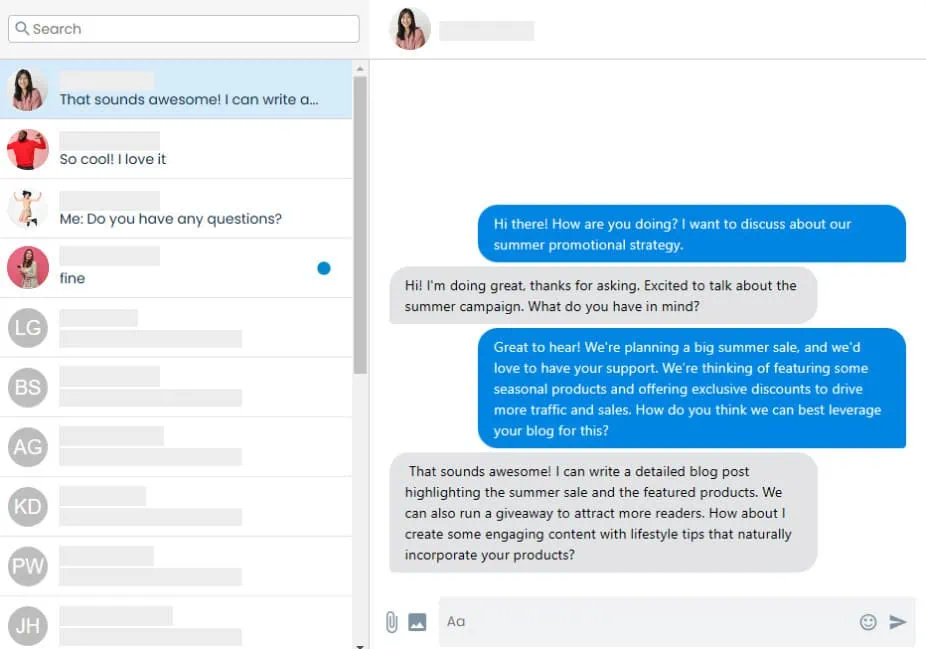
Offer attractive incentives and rewards for affiliates
As an affiliate manager, recognizing your affiliates’ hard work is really important. And nothing motivates them better than generous rewards to keep them engaged and committed to your brand.
While competitive commission rates are a good start, you can enhance motivation further by giving additional incentives to affiliates who hit specific milestones, like reaching a specific number of online sales or bringing in significant revenue. These rewards could be cash, exclusive products, or even gift cards.
Plus, you can also create seasonal or limited-time affiliate bonuses. Such perks will encourage your partners to promote certain products or focus on peak seasons for extra earnings. This strategy not only boosts sales during key times but also keeps your affiliates excited with new opportunities.
8. Track and measure affiliate performance
Launching an affiliate program is just the beginning. For long-term success, it’s crucial to regularly monitor performance and continually optimize.
You should use your goals and KPIs to measure effectiveness. Focus on some key metrics, such as:
- Clicks and traffic: See how much traffic each affiliate is driving to your website.
- Conversion rate: Monitor the percentage of clicks that turn into actual sales.
- Sales and revenue: Track affiliate sales and measure the revenue they generate.
- Average order value (AOV): Calculate the average order value from sales made through affiliate links or coupons.
- Return on investment (ROI): Evaluate the profitability of your affiliate program compared to its cost.
- Customer lifetime value (CLV): Assess the long-term value of customers acquired through your affiliates.
To accurately measure these metrics, use a reliable affiliate management tool that provides real-time data and detailed reports on affiliate performance.
If you use UpPromote, our app will offer a comprehensive suite of tracking methods. So, you’ll gain deeper insights into your program’s performance, including total affiliates, orders, commissions, referral sources, and referral status.
Then, you can visualize the real-time reports through graphics, charts, and data tables.
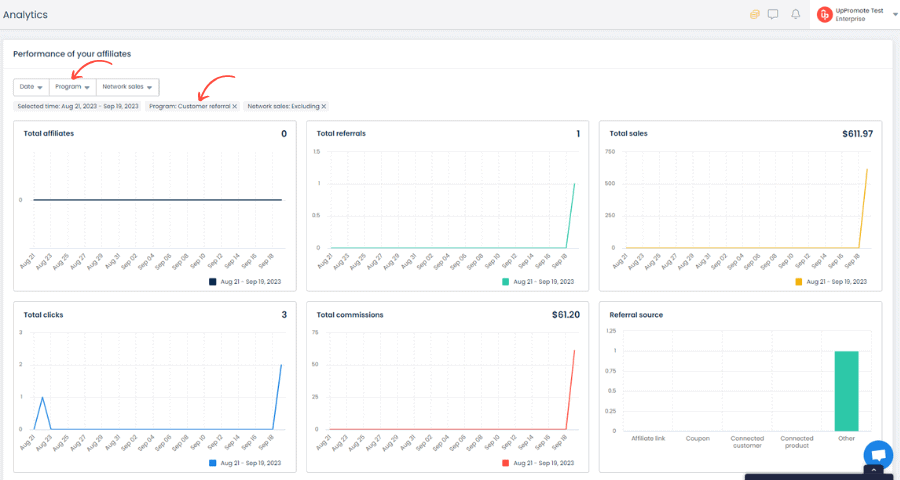
By keeping an eye on affiliate analytics, you can identify what works and spot areas for improvement. This allows you to make data-driven decisions to optimize your campaign.
And what about optimization? It will involve:
- Adjusting incentives: Tailor rewards based on affiliate performance and your specific goals.
- A/B testing: Test different types of commissions (tier commission, special product commission, etc) to see which drives the best outcome.
How to Set up an Affiliate Program with UpPromote?
Now, you are ready to create an affiliate program for success.
To make it quick and hassle-free, start with UpPromote, the top-rated affiliate solution on Shopify. Our software will simplify the setting process and help you jumpstart affiliate marketing right away.
Join 115,000+ UpPromote users to build affiliate programs in minutes—no coding involved!
Let’s take a look at how to set up a program with UpPromote:

1. Install UpPromote
The first thing you need to do is connect our app to your Shopify store.
If you haven’t set one up on Shopify yet, you can start for free and enjoy the first month for just $1.
Then, search for UpPromote in the Shopify App Store and select Install.
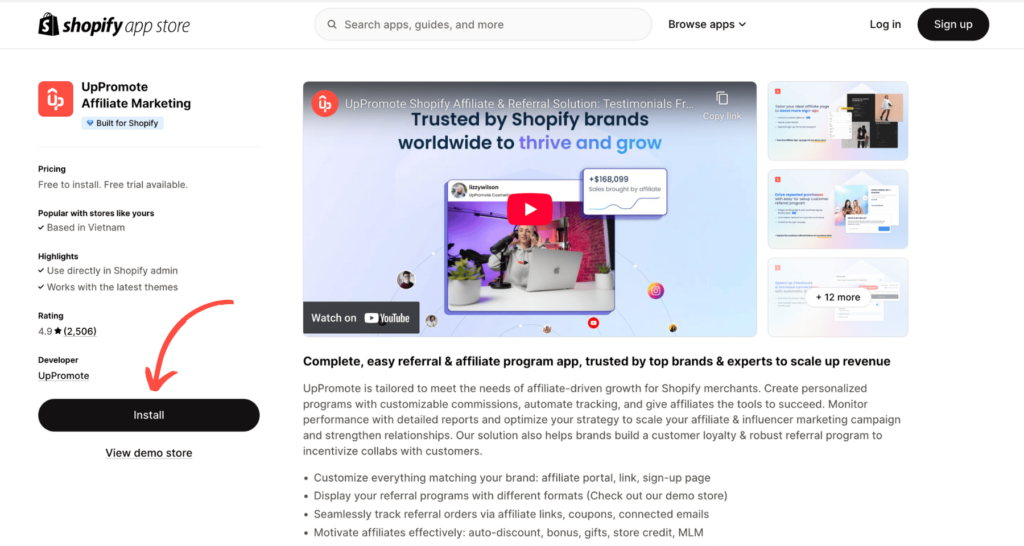
Once you do so, you will be directed to the embedded Shopify interface. Simply click on the Install button to add UpPromote to your store.
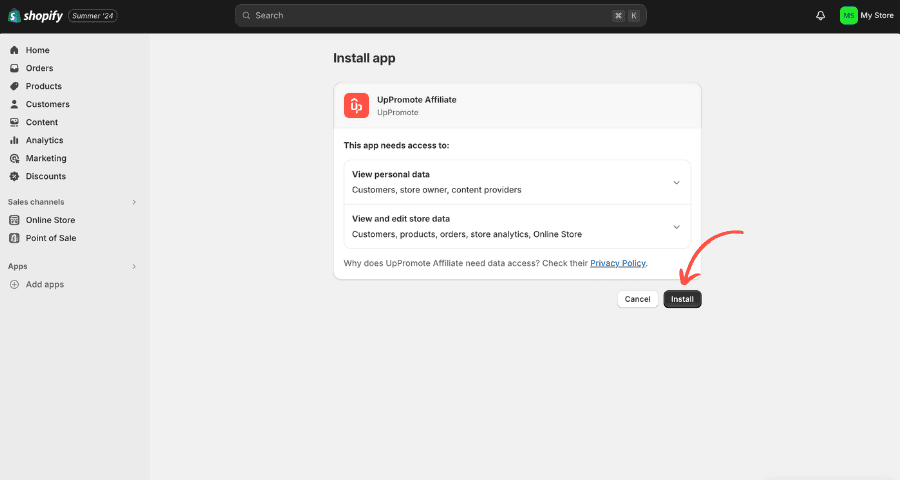
After that, you move to the next step. Here, you will fill out your details (your name, email address, and more). You can also rename the subpath to your brand’s name. Click Register to finish the installation.
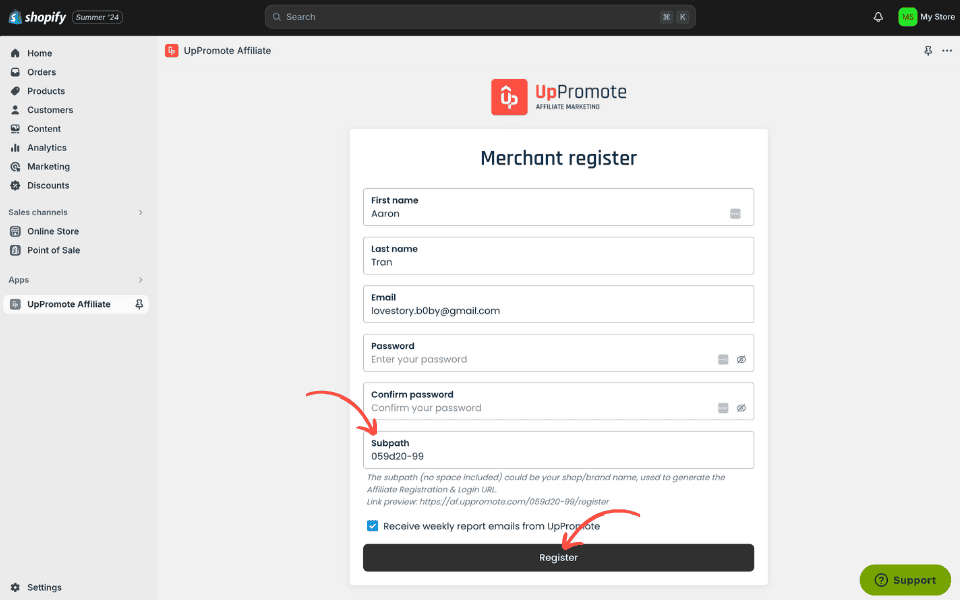
2. Configure settings for your affiliate program
Now, it’s time to set up your first affiliate campaign.
Don’t worry! We’ll guide you through the process and help you launch it in no time.
Start by choosing an affiliate tracking method and deciding on the commission type.
For instance, if you wish to establish a campaign where affiliates are compensated based on a percentage of sales, such as a 10% commission, you can set it up like this.
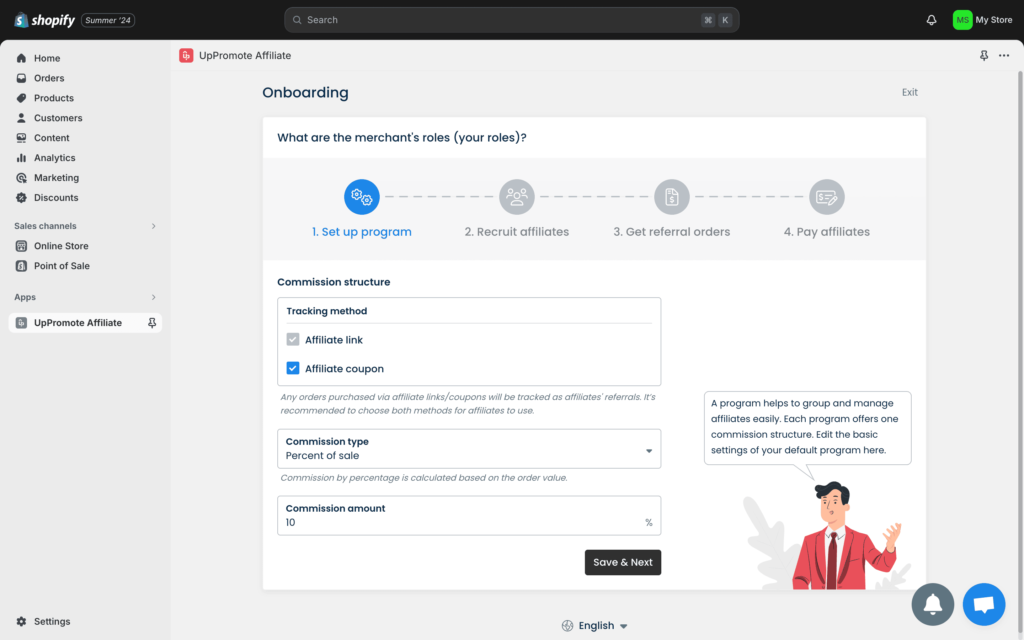
With both recruit affiliates and get referral orders steps, our system lets you set up a test affiliate email to see how the affiliate marketing process works in the app.
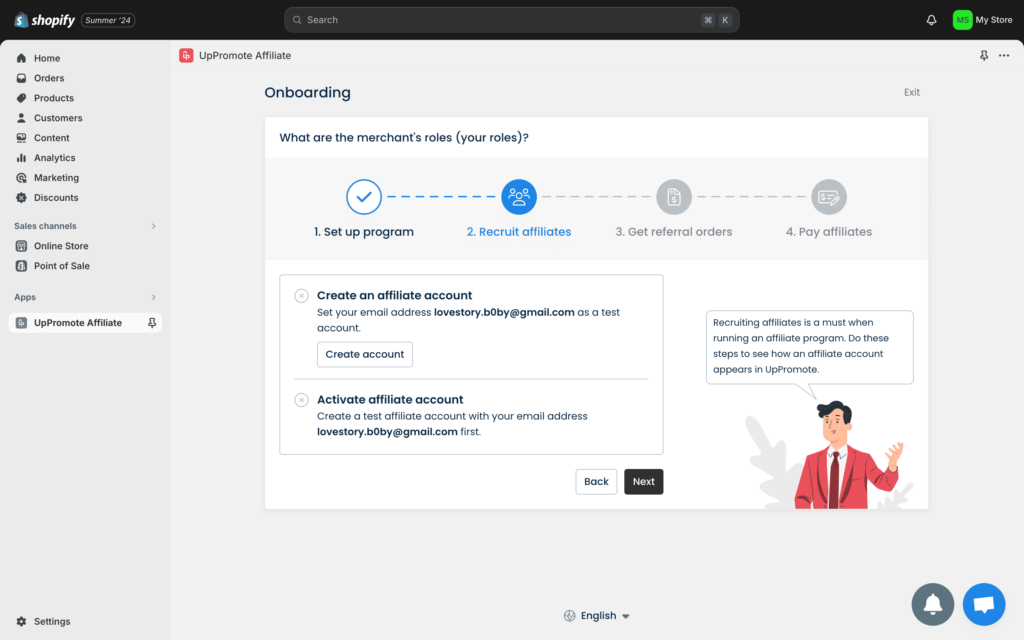
Next, select the payment method, for example, PayPal and Debit Card, to complete the setup.
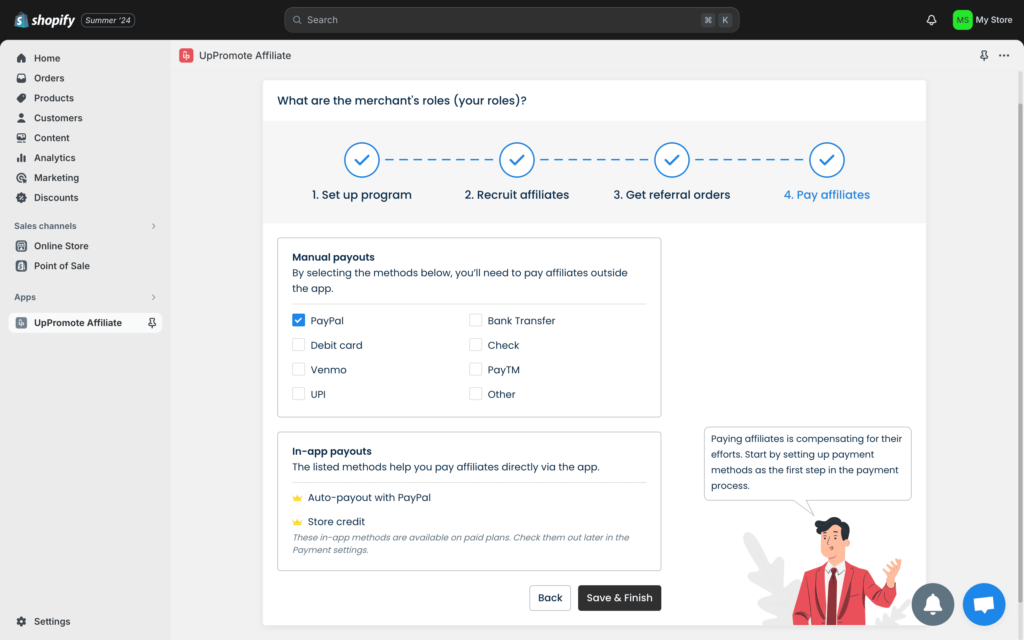
Then, a pop-up will appear in the UpPromote dashboard to guide you. It will suggest to you what to do next to customize a program that perfectly matches your brand.
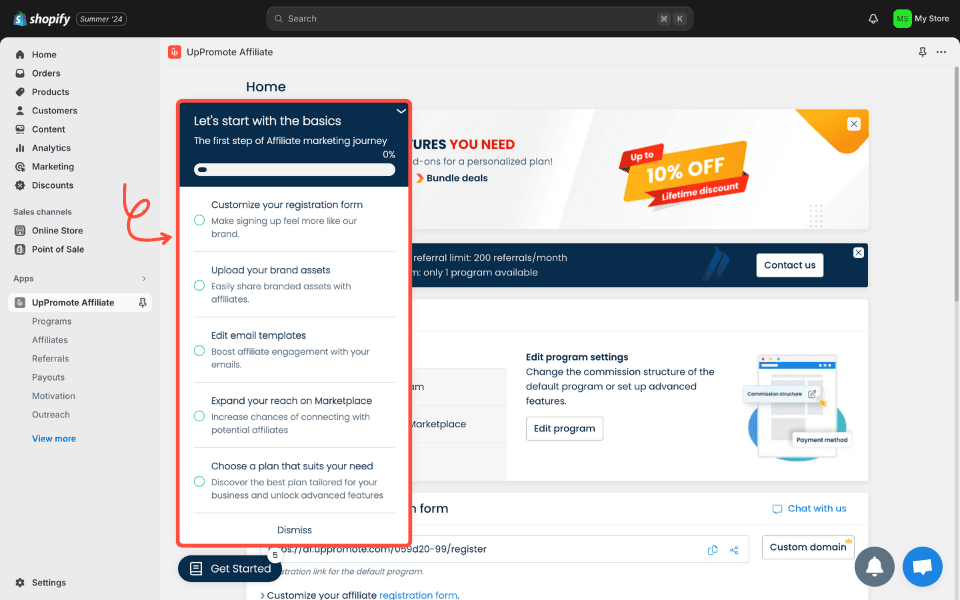
If you want to change the commission structure of your first program or start a new campaign, go to the Program tab. You’ll see the Program List:
- To add a new program, click Add Program.
- To edit an existing one, click on the program’s name.
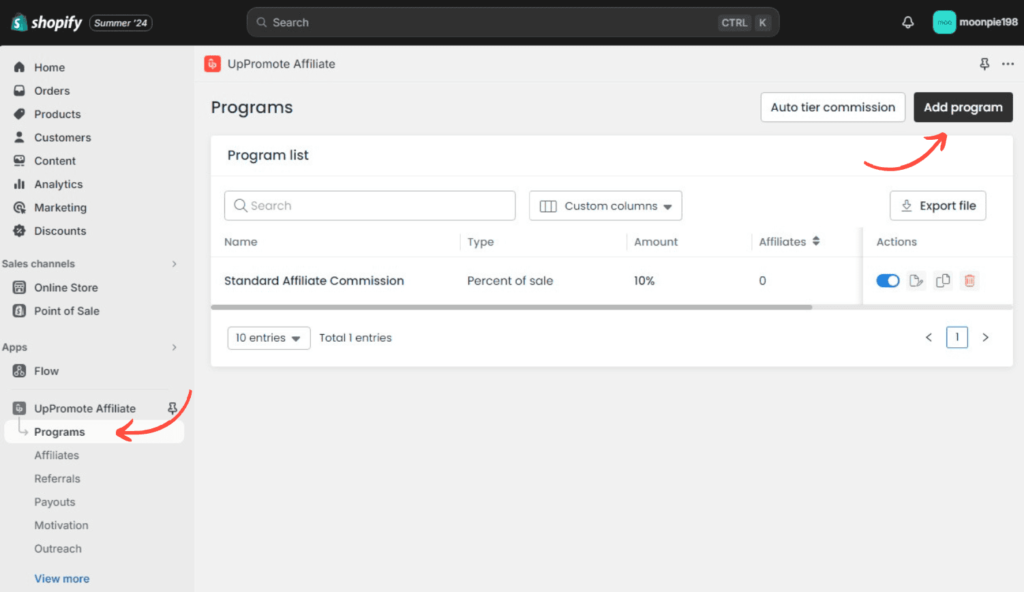
To promote your program, remember to create an affiliate form. This will help interested people easily sign up to join and become your affiliates.
To tailor an affiliate application form that fits your needs and your brand’s identity, go to Settings > Affiliate admin > Registration page > Click on the Customize button on the ‘Registration page’ section.
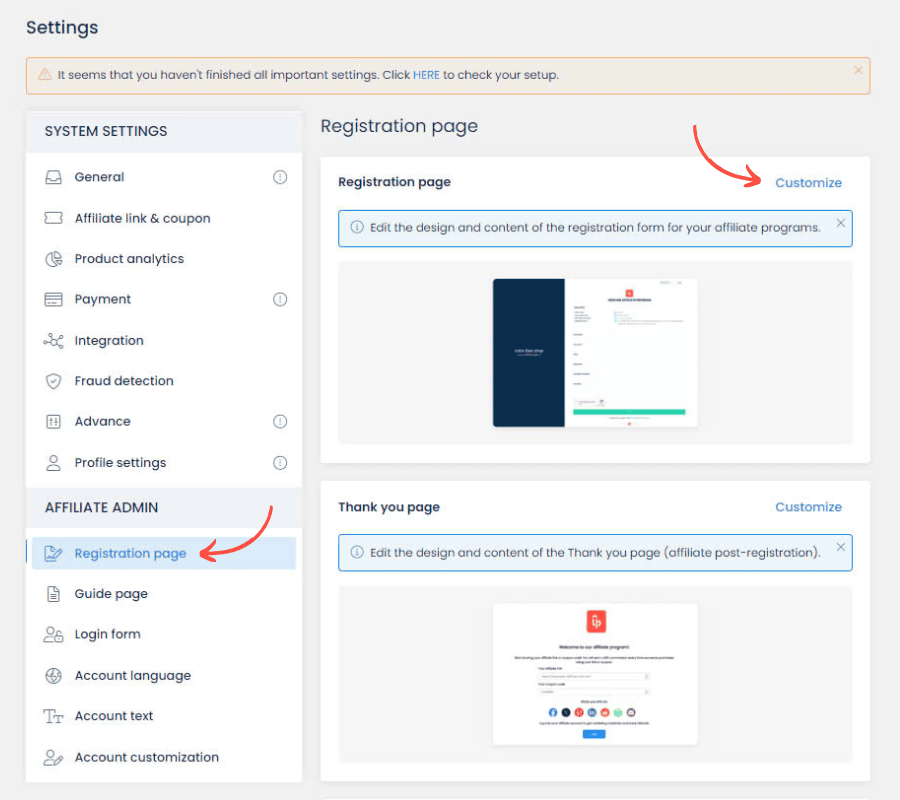
There are 3 options available to choose from:
- The basic template: It’s free to use and provides essential options to create a standard registration form.
- The premium templates (also known as Trendy & Comfort templates): Enable you to design a modern look with diverse layouts for your affiliate form.
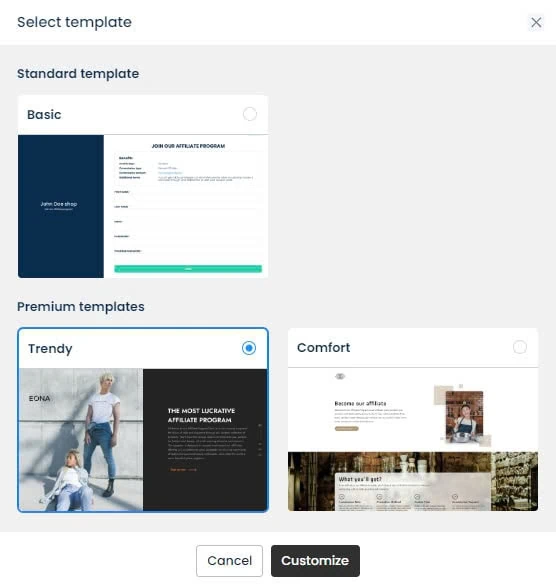
UpPromote also allows you to publish your affiliate registration page on the store’s website and more. It’s a great way to bring your program to potential affiliates.
3. Manage your affiliate program
After launching your affiliate program, you need to manage it to ensure everything runs smoothly and effectively. We’ll show you some of the things you can do with UpPromote.
To view affiliates that have joined your program, you can head to the Affiliates tab > Affiliates page. Here, you can see a full list of your promoters.
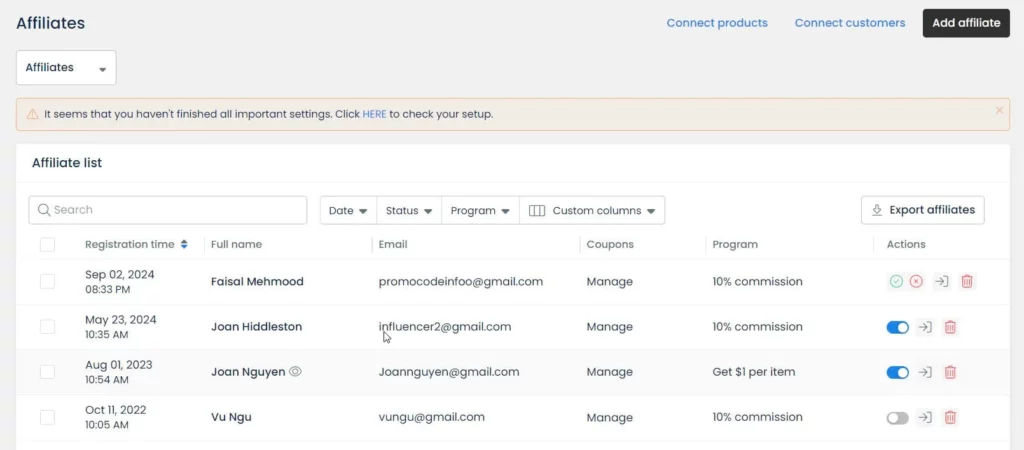
If you want to check the orders made through your referral program, go to Referrals > Affiliate referrals. Our app will show the details for your review:
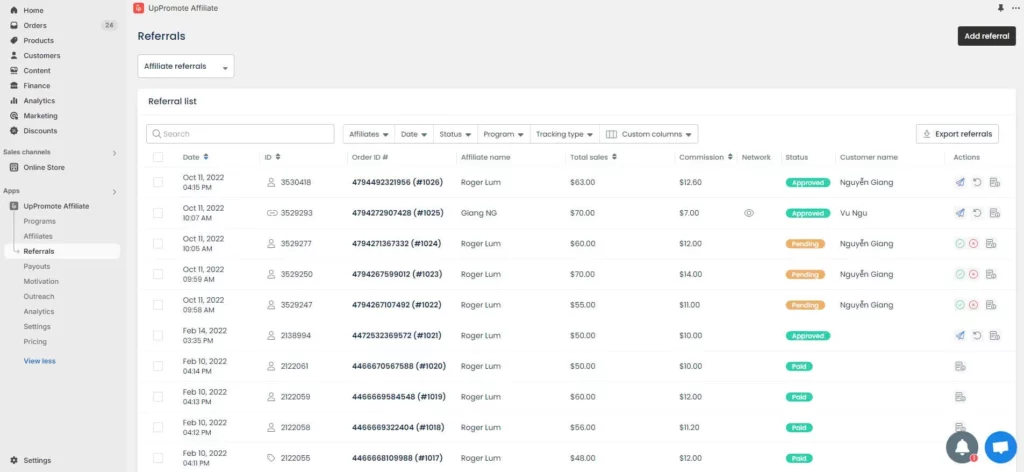
And here’s the best part: You can get real-time insights into your program’s performance through detailed reports with UpPromote.
Navigate to Analytics. Then, you will see graphical reports on conversion statistics, such as Clicks, Referrals, Sales, and Commissions.
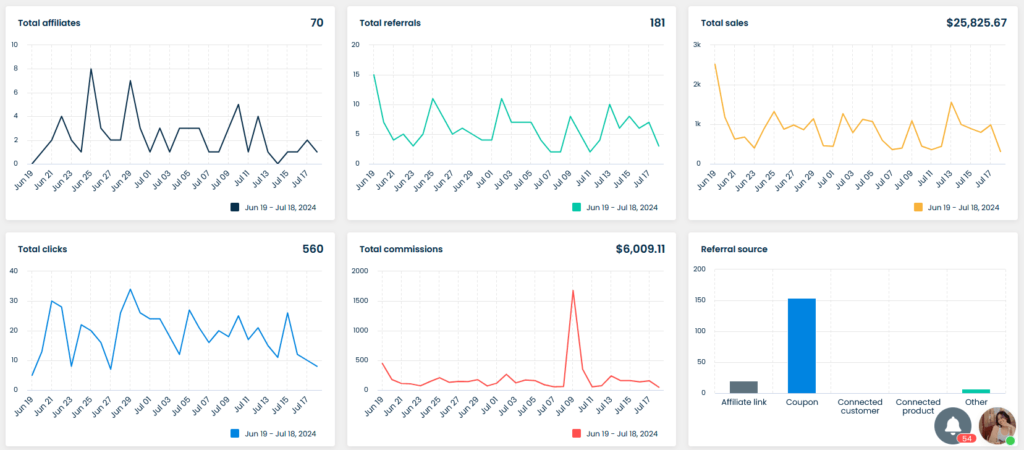
Plus, you can delve into and identify top affiliates and the most preferred products to optimize campaign results.
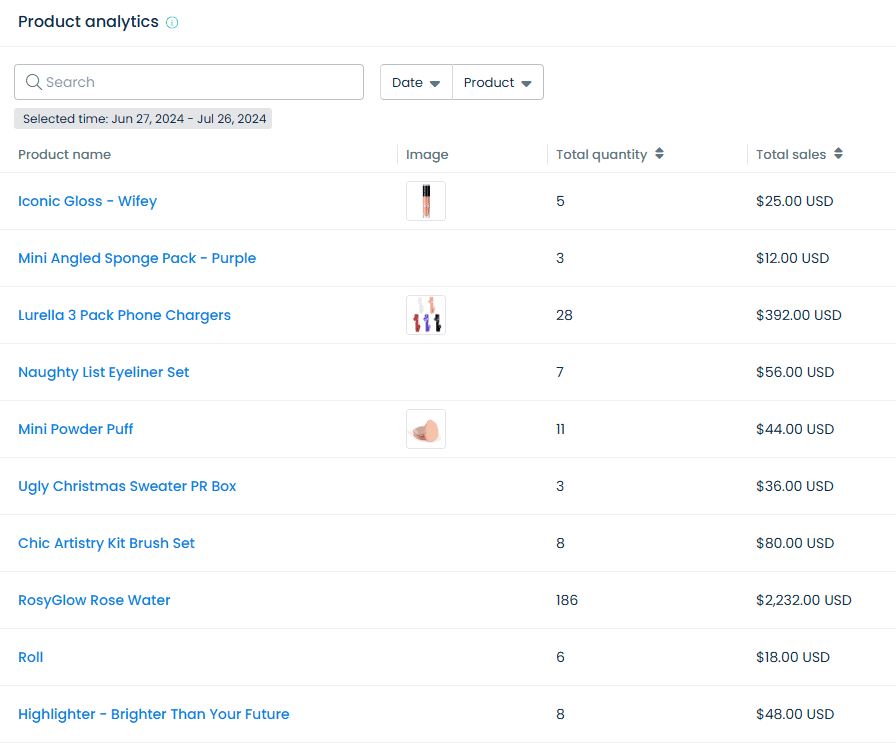
This way, you can adjust your strategies to boost sales even more. For example:
- Run special campaigns for your top-selling items
- Bundle products to increase the average order value
- Offer exclusive discounts to encourage more purchases
- Give lucrative bonuses to top-performing affiliates to motivate them
Case Studies and Best Practices for a Successful Campaign
Tapping into affiliate marketing will help you grow your brand and increase sales, but don’t expect overnight success. Just launching your campaign isn’t enough. To truly thrive, you need a detailed plan and smart tactics to achieve your goals.
Getting inspired by successful affiliate marketing campaigns is a great idea. It can help you learn proven strategies and discover best practices for your program.
Here are some success stories to check out:
Holbrook Pickleball

Holbrook Pickleball started as a family-owned business specializing in providing high-quality pickleball paddles and gear.
By running a successful affiliate program, the brand achieved fruitful results:
- 173 new affiliates joined the program
- Orders through ambassadors increased by 87% by the end of 2023
- Affiliate revenue grew by 86% in just one year
What affiliate marketing strategy can you learn from Holbrook? Here’s the list:
- Offer competitive commission rate: The brand gives ambassadors a 15% store credit for every sale made with their code, helping boost repeat purchases and improve the customer retention rate.
- Run monthly sales contests: Affiliates who reach monthly sales goals win prizes like products or bonuses.
- Attend pickable events: The brand often participates in national pickable events to meet new influencers and seek collaboration opportunities to grow its affiliate team.
- Closely monitor affiliate sales & send gifts to top performers: Using UpPromote’s analytics dashboard, Holbrook tracks real-time sales data to spot top affiliates and quickly rewards them with gift packages.
TréSkin
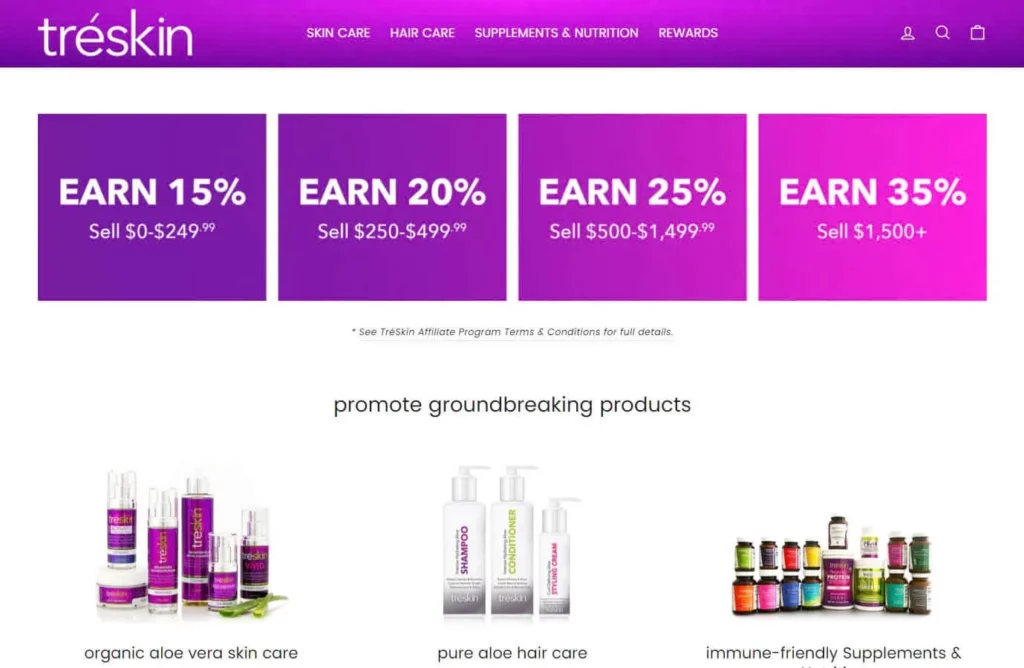
TréSkin, a top organic beauty and health brand from the USA, is another successful example of affiliate marketing.
In just one quarter of running a campaign through UpPromote, the brand saw strong sales growth, with over $120,000 in affiliate revenue.
How did TréSkin achieve such amazing results? Here are some smart tactics that the brand applies:
- Leverage social media platforms like Facebook, LinkedIn, and Instagram to share their offer.
- Promote the program on the UpPromote Marketplace, increasing the chances that potential affiliates will discover and sign up.
- Customize separate programs for different affiliate levels after identifying suitable influencers and placing them on a curated list.
- Introduce tiered commission rates to encourage better performance and higher earnings.
Common Mistakes in Affiliate Marketing & Tips to Avoid
If you’re new to affiliate marketing, it’s important to be aware of common pitfalls and know how to address them to run a successful program.
Here are some of the most common issues and tips on how to avoid them:
- Ignore onboarding and training for affiliates
Without proper onboarding, affiliates may not fully grasp your products or brand, leading to off-track promotions.
Prevent this by offering a clear onboarding process. This could include detailed guides, tutorial videos, and even live sessions, if necessary, to ensure that your partners are well-informed and aligned with your brand identity.
- Neglect regular communication with affiliates
Failing to communicate regularly can leave affiliates feeling disconnected and make you miss out on valuable feedback from partners.
You should schedule regular check-ins via email, direct messages, or online calls to ask how they’re doing and offer support when needed.
- Overlook fraud risks
Affiliate fraud, like fake clicks or scam referrals, can damage your program’s accuracy and cut into your profits.
Using affiliate tracking software with fraud detection can help you prevent fraudulent activities. You also need to set clear rules and implement strict policies to address any issues when they arise.
- Not providing consistent and timely payouts
Inconsistencies or delays in payments can make affiliates feel unsure about their earnings and damage your program’s reputation.
To avoid this, you should automate your payment systems to ensure timely payouts and communicate clearly with affiliates about any delays.
- Lack of transparency in tax and invoice matters
Lack of clarity in handling taxes and invoices can lead to errors in financial reporting, disputes over payments, and even legal issues.
To prevent this problem, stay updated on local tax laws and utilize a reliable accounting or an affiliate management app to handle taxes and invoicing accurately.
Wrapping Up
Starting affiliate marketing is a great way to boost brand awareness and drive more sales for all types of businesses, from start-ups to established entrepreneurs.
One of the first steps is to create an affiliate program tailored to your products or services, ensuring it aligns with your business goals and target audience.
We hope our guide helps you build a successful affiliate campaign, whether you offer physical goods, digital products, or subscription services.
To make it work, set measurable goals, plan carefully for recruiting affiliates, and keep track of how things are going. Continuously improve your program with smart strategies to get the best results.
Using an affiliate marketing platform with robust features can help you quickly launch your campaign and manage it smoothly, so you can avoid mistakes and set yourself up for success



